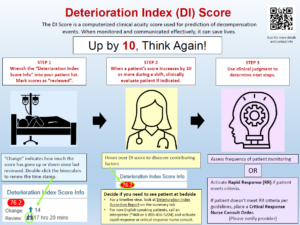The QI project team led by Jay Lamba, MD, PhD, and Hillary Spangler, MD, is highlighting clinical champions who are frequently using the Deterioration Index Score in EPIC to critically evaluate the health needs of their patients.

The Deterioration Index (DI) Score in EPIC is a computerized clinical acuity score used for prediction of decompensation events. When monitored and communicated effectively, it can save lives. The MPCU and Rapid Response Team have piloted use of the DI Score during the past year. Learn first-hand how a DI Score “champion” is effectively using this tool.
This week’s feature is of Nick Piazza, MD:
Q: What do you find helpful about reviewing a patient’s DI score?
A: When combined with good medical judgement, the DI score is an extremely helpful indicator that I use daily on rounds for my inpatients. When I have multiple new patients in the morning, a quick glance at the DI score helps me triage where I need to focus my immediate concerns and helps me be more efficient.

Q: How easy or difficult is it for you to review a patient’s DI score?
A: Checking the score is easy – add ‘deterioration index score info’ under the properties menu on your patient list. This creates a column displaying a color coded score, change, and time since last review. You can ‘review’ the score simply by double clicking the little binoculars by the time since last reviewed.
Q: Do you have an example of where reviewing a patient’s DI score alerted you to the need for an intervention?
A: On multiple occasions seeing a jump in a DI score has given me an early warning to get to the bedside to evaluate patient. I have also found it to be an effective way of improving communication with our nurses – much like a change in vital signs, a major change in the DI score should spark conversation among the care team and be an indicator for a touch point to get everyone on the same page.
Please reach out to Jay Lamba MD, PhD, or Hillary Spangler, MD, with questions or suggestions for another DI Score champion. Please also use the tip sheet in this article to learn more about how to use the DI score.